- Home
- Bette Lee Crosby
Memory House: Memory House Collection (Memory House Series Book 1)
Memory House: Memory House Collection (Memory House Series Book 1) Read online
MEMORY HOUSE
The Memory House Series
Book One
BETTE LEE CROSBY
MEMORY HOUSE
Copyright © 2015 by Bette Lee Crosby
Cover design: damonza.com
Formatting by Author E.M.S.
Editor: Ekta Garg
All rights reserved. No part of this publication may be reproduced or transmitted in any form by any means, electronic or mechanical, including photocopy, recording, or information storage and retrieval system without permission in writing from the author, except by reviewers who may quote brief passages for a review to be printed in a newspaper, magazine or journal.
This is a work of fiction. While, as in all fiction, the literary perceptions and insights are based on life experiences and conclusions drawn from research, all names, characters, places and specific instances are products of the author’s imagination and used fictitiously. No actual reference to any real person, living or dead, is intended or inferred.
ISBN-13: 978-0-9960803-7-8
BENT PINE PUBLISHING
Port Saint Lucie, FL
Published in the United States of America
For Mom…
Because you have given me
a heart filled with magical memories.
MEMORY HOUSE
A memory is what is left when something happens
and does not completely unhappen. ~Edward de Bono
On the far edge of Richmond, Virginia, there is a section called Burnsville. It’s a little-known patch of winding streets and quaint houses, some of which date back to the nineteenth century. Ophelia Browne lives in the white house at the end of Haber Street.
A passerby would not readily notice her house. It is small and simple, partially hidden by a weeping willow older than the house itself. In the sunlit room that was once her front parlor, Ophelia now has a small apothecary shop. The shelves are lined with bottles and baskets of powders and potions that can produce beauty in the eye of the beholder, cure hiccups, restore faith and some say even cause an impossible love to blossom.
Beyond the shop a narrow hallway leads to two bedrooms at the back of the house. These are the rooms Ophelia rents to weary souls who come in search of a night’s rest.
Only those with a sharp eye will see the tiny sign planted alongside the walkway, and only those in need of solace will pull to the side of the street, park partway on the grass and rap the brass knocker on the front door.
~ ~ ~
When Annie Cross leaves Philadelphia she has no destination in mind. She simply wants to get away from Michael, to get away from a thousand subtle reminders of the love that has died a slow and painful death. For years they’d been good together; then something happened. Not one big argument; just a long stretched-out series of small slights and pointy barbs. In the end he’d moved out, taking his stuff and leaving behind a note that claimed he was sorry.
The truth is Annie was as weary of the relationship as Michael, and had she been the one to leave it might not have pained her heart as it did. But she wasn’t the one to leave. He was. He moved on and found himself a new apartment, one without stale memories and bitterness clinging to the walls. She was left behind, stuck in their old life but with a chunk of it missing.
Michael is gone and yet he isn’t. There is the razor he left on the bathroom shelf, the slippers still tucked under his side of the bed and the smell of musky cologne that lingers in the half-empty closet. Magazines addressed to Michael Stavros still cram the mailbox, and the doormen still greet her as Missus Stavros.
The irony of it was that they weren’t married. They never had been. In the beginning it was what they’d fought about most often, but in time that issue grew thin and morphed itself into countless smaller and less significant problems—a toilet seat left up, newspapers scattered across around the living room, a burnt pork chop, an unwashed coffee pot. Their complaints became unvoiced words, like bricks of resentment and anger stacked on both sides of an invisible wall.
Weekdays Annie can lose herself in work. She can dash out the door, grab a coffee at Starbucks and get through the day without reminders. But the evenings are long and weekends torturous.
She and Michael had been together for seven years, and in those years her friends got married and started raising families. Occasionally two or three couples got together for an evening out, but it was always couples and the conversation was most often about children and home repairs. Neither subject interested Michael, and he made no effort to hide his feelings. Little by little her friends fell away, and now Annie is left with a handful of colleagues at the office and a few neighbors living on the fifth floor of the Remington Arms.
That Friday afternoon when Annie tosses her overnight bag into the back seat of the Toyota and pulls out of the garage she is hoping to forget. Little does she know this trip will be the start of remembering.
~ ~ ~
Annie almost misses the sign, hidden as it is behind the swaying branches of the weeping willow. She stops the car and peers down the dimly lit walkway. A split second before she is ready to shift into drive and move on, the last ray of sunlight dances across the gold lettering and she sees the words “Memory House Bed & Breakfast.” Years earlier the sign was white as fresh-fallen snow, but over time it has aged to a color that is now all but invisible against the dusk of evening. Only the gold lettering remains as bright as it has always been.
Annie parks the car, straddling the gully between the street and the grass. She hoists her overnight bag from the back seat and starts up the walkway. A few steps from the front porch she feels a tingle at the back of her neck, and suddenly it seems she’s been here before. A feeling of familiarity settles over her, and for a fleeting moment she hears the whisper of words. Startled, she stops and turns. She expects to see someone following in her footsteps, but there is only a small splatter of sunlight and the fluttering branches of the willow.
Glancing over her shoulder once more, she steps onto the porch and raps the knocker. When the door creaks open, a little old lady stands in the glow of yellow lamplight.
“Good evening,” Ophelia Browne says.
Annie hesitates for a moment then replies, “The fellow down at the gas station suggested your place for a bed and breakfast. I don’t have a reservation but I thought maybe…”
Ophelia can see the weary look on the girl’s face. “No need to apologize. I’ve got no other guests tonight, so there’s plenty of room.”
Annie smiles, introduces herself and then follows the woman into the center hall. As they walk toward the back rooms, Annie catches the scent of something sweet—roses maybe or gardenias. It would be two, possibly three months before such flowers would bloom in Philadelphia, but she’d traveled south so conceivably…
“Is that roses I smell?” she asks.
Ophelia gives a soft chuckle. “No, that’s my potpourri.” She points a gnarled finger toward the glass bowl sitting atop a tiny three-legged table.
“Oh.” Annie nods. “Made from dried roses?”
Ophelia shakes her head. “No roses. It’s mostly passion flower and vanilla.”
Annie takes a deep breath. “Funny, I don’t smell vanilla at all.”
“You wouldn’t unless vanilla was your favorite fragrance. It’s a remembrance blend. It reminds you of something that’s brought happiness.”
Annie stops, turns back and sniffs the air again. This time she catches the scent of lilacs. It is so powerful that if she closes her eyes she will imagine herself a child again, still living in the house where the fr
agrance of summertime lilacs drifted through her bedroom window.
The thought of a potpourri that changes scent teases Annie’s mind. As she follows Ophelia down the hallway she asks, “Would it smell like chicken soup to someone who has good memories of chicken soup?”
Ophelia nods.
“What about burnt toast?”
Ophelia chuckles aloud. “I can’t imagine burnt toast being someone’s favorite, but, yes, it would give off the smell of burnt toast.” She stops and eases the door on the right side of the hallway open. “Here’s your room.”
The room is decorated in pinks and mauves; it has the look of a little girl’s room, a bouquet of prints blending into one another and the large double bed covered in a comforter that appears fluffy as a cloud.
“It’s lovely,” Annie exclaims. She steps inside and sets her overnight case down alongside a large mahogany dresser.
Ophelia makes no attempt to close the door, nor does she walk away.
She watches Annie move around the room, first touching her hand to one thing and then another: the crocheted doily on the dresser, the ruffled curtain, a silk lampshade.
“This is my favorite room,” Ophelia says. “It overlooks a pond filled with ducks and geese. The squawking can be a bit annoying early in the morning, but they are a delight to watch. If you think the noise will bother you—”
“Not at all,” Annie replies. “I’m an early riser.”
“Well, then, I’ll leave you to settle in.” Ophelia pulls the door closed and starts back down the hall. She’s gone only a scant two or three steps when a thought comes to her and she turns back.
She raps on the bedroom door and calls out, “Excuse me.” When the door swings open she says, “It occurred to me that you might not have had dinner.”
Annie smiles. “Actually I haven’t. Maybe you could suggest a nearby place—”
“I’ve made a wonderful stew,” Ophelia interrupts her. “I’d love to have you share it with me.”
“If you’re sure it’s no trouble.”
“No trouble at all,” Ophelia replies. “Get yourself settled then come around to the kitchen.” She turns and walks off.
Annie cannot see the smile that curls the old woman’s lips.
A Pinch of Rosemary
Ophelia Browne remembers everything. She remembers things from her own life and from the lives of those who came before her. She has only to touch her hand to an object and she can feel the special memory clinging to it. But now she is getting on in years. In eleven months she’ll turn ninety. Few women in the Browne family live beyond such an age. If death comes before she finds a replacement, the memories might be lost forever. Ophelia prays this won’t happen.
For the past five years she’s studied the face of every guest arriving on her doorstep. She’s looked into their eyes and seen the souls of people rooted to reality. Not one has shown even a flicker of promise, and time is growing short.
Now there is hope. This new guest, the girl from Pennsylvania, could easily be the one. Ophelia noticed it the moment she opened the door. The girl has the look of a person who can see beyond what is and reach back for what was. Seldom has Ophelia come across such deep violet eyes and never with the flecks of green that once danced in her own reflection.
With the passing of time, the color of Ophelia’s eyes has changed. They are now a steely gray but in her younger years they were violet, the same deep shade as those of the girl.
A broad smile spreads across the old woman’s face as she reaches into the kitchen cupboard and pulls a never-before-used jar from the top shelf. She pries open the top, sprinkles a generous helping of the dried leaves into the stew and begins to stir.
When Annie walks into the kitchen the stew is simmering on the stove, and the table is set with white porcelain dishes and silver spoons. In the center of the table is a basket piled high with biscuits.
“Oh my goodness,” Annie exclaims, “everything smells so delicious.” She glances around to make sure it is not another scent-switching potpourri tickling her senses.
“It’s the biscuits,” Ophelia replies. “Nothing smells as good as biscuits fresh from the oven.” She motions to the chair on the far side of the table, invites Annie to sit and then asks if she would care for something to drink.
The day has been long and tiring. Highways with little to look at. Billboards touting burgers and outlet malls. Tractor-trailers rumbling by. Bugs splattering across the windshield. Annie would like something to ease the tension in her shoulders and the stiffness in her back. She thinks of a glass of burgundy but before she can mention it, Ophelia suggests, “Dandelion tea, perhaps?”
A bit disappointed with the alternative, Annie curls her mouth into a shallow smile.
“I’ve never had dandelion tea,” she says, “but I’d be willing to try it.”
Ophelia pours two cups of tea, then settles herself in the other chair.
At first the tea seems to have a slightly bitter tang, but after only a few sips Annie discovers it has a sweetness that lingers on her tongue. She helps herself to a biscuit, butters it lavishly and continues sipping the tea. By time the cup is empty the tension in her shoulders is gone, and she’s completely forgotten the stiffness in her back. She’s also forgotten about Michael.
Seeing the relaxed smile on the girl’s face, Ophelia says, “The stew should be done by now.” She rises from her chair, stirs the mixture once more time and then fills both bowls.
After a single mouthful Annie declares the stew delicious. “Is this lamb I taste?”
“Afraid not.” Ophelia laughs. “It’s the herbs and vegetables from my garden.”
Annie looks up wide-eyed. With her spoon stalled halfway to her mouth, she gasps. “You have a garden?”
“Of course. Why wouldn’t I?”
Struggling with such a thought, Annie says, “But isn’t it rather strenuous for a woman your age? Bending down, digging in the dirt?”
“I’m a Browne,” Ophelia replies. “Brownes are made of sturdy stock.”
“I suppose so.” Annie lowers the spoonful of stew back into the bowl and sits quietly. How could it be, she wonders, that a woman so far along in years does all this and she, a person who is not yet thirty-three, does nothing? Perhaps if she’d been born a Browne…
For a brief span of time both women are caught up in their own thoughts of what was and what could have been.
Ophelia, wrapped in the pleasantries of memory, begins telling how as a toddler she’d learned to love growing things. She goes on for almost ten minutes describing the trailing vines of nasturtium, patches of crimson clover and rows of basil growing side by side with thyme.
“And then there’s rosemary,” she says. “Add the tiniest pinch of that to your tea, and you’re certain to have sweet dreams.”
Annie has not enjoyed pleasant dreams for a good number of years. They would certainly be a welcome change from the restless nights of wondering what had gone wrong.
“Is there any rosemary in this tea?” she asks hopefully.
A faraway look shadows Ophelia’s face as she shakes her head. “No. This is dandelion tea. I drink it because…”
She stops, knowing it is too soon to speak of the gift. After a few seconds of hesitation, she moves on to telling how ginger can produce a heated love affair.
As she explains how eucalyptus leaves can be ground into a powder that will cure even the common cold, Ophelia notices the girl’s expression grow somber.
“Have I said something wrong?” she asks.
Annie sighs. “Not at all. I’m just a bit envious.”
“Envious of an old lady?”
Annie gives a tight little laugh. “Not really. But I do envy your ability to grow such wonderful things.”
“Shoot, anybody can garden. It doesn’t take a whole lot of know-how. You drop the seeds in the ground and then—” Ophelia is going to say God does the rest, but she never gets the chance.
“Ground.” Ann
ie grimaces. “That’s the problem. I live on the fifth floor of an apartment building. There’s no place to plant anything. Once in a while a blade of grass pops up between the bricks in the courtyard, but that’s it.”
Ophelia nods knowingly. “I see what you mean.”
For several minutes they sit quietly, each waiting for the other to speak. If you were to look inside the two minds you could see they wanted the same thing, but there is no obvious way of getting to it. When the silence grows thick as fog, they both open their mouths at the very same moment.
“I was thinking—”
“If you wouldn’t mind—”
The words bump into each other, and they begin to laugh.
Annie spreads her hands with palms up. “You first.”
“Okay.” Ophelia laughs. “I was thinking if you’re going to be here a few days, you could try your hand in my garden.”
Annie’s fingers fly to her mouth and she guffaws aloud. “That’s the craziest thing ever!”
“It’s not that crazy,” Ophelia says. “I only offered because—”
Annie stops her. “I didn’t mean the idea was crazy, I meant it was crazy because I was going to say if you wouldn’t mind maybe I could help out in your garden.”
They laugh again, and the jumble of words evolves into a conversation of possibilities. Ophelia promises to show the girl a world of wonders, a world of growing things and potions that can repair even a broken heart. Annie’s eyes glow an even deeper shade of violet with the tiny green flickers sparkling as she listens.
And thus it is decided. Although she has brought only enough clothes for a three-day getaway, Annie now plans to stay the week. She will rinse out her undies each night and make do with the single pair of jeans she’s packed. Any other time such a change of plans would be unthinkable, but this time it is different. Like Alice falling down the rabbit hole, she is caught up in a magical adventure.

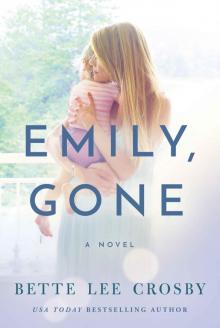 Emily, Gone
Emily, Gone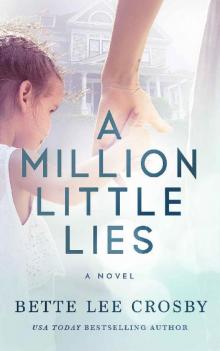 A Million Little Lies
A Million Little Lies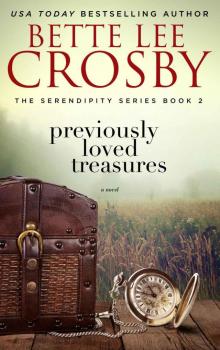 Previously Loved Treasures
Previously Loved Treasures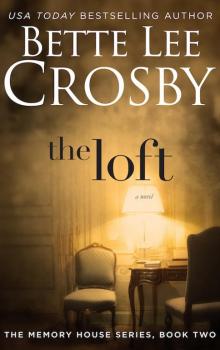 The Loft
The Loft Spare Change
Spare Change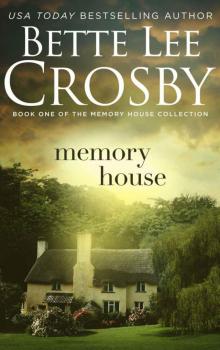 Memory House: Memory House Collection (Memory House Series Book 1)
Memory House: Memory House Collection (Memory House Series Book 1)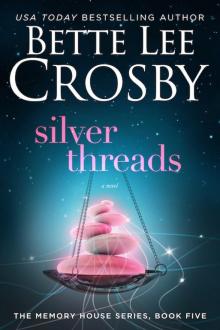 Silver Threads
Silver Threads Wishing for Wonderful: The Serendipity Series, Book 3
Wishing for Wonderful: The Serendipity Series, Book 3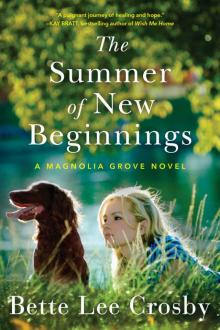 The Summer of New Beginnings: A Magnolia Grove Novel
The Summer of New Beginnings: A Magnolia Grove Novel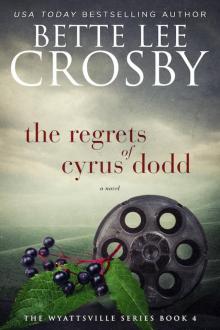 The Regrets of Cyrus Dodd
The Regrets of Cyrus Dodd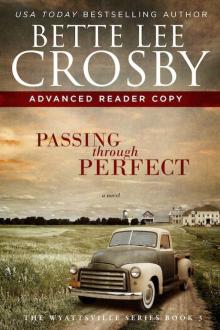 Passing Through Perfect
Passing Through Perfect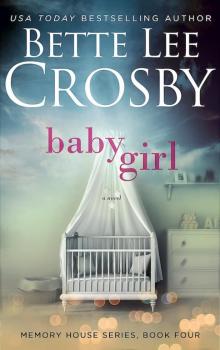 Baby Girl
Baby Girl Jubilee's Journey
Jubilee's Journey Beyond the Carousel
Beyond the Carousel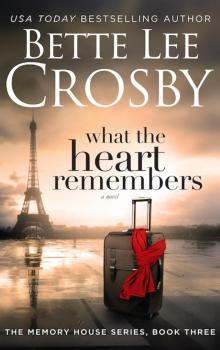 What the Heart Remembers
What the Heart Remembers Cupid's Christmas
Cupid's Christmas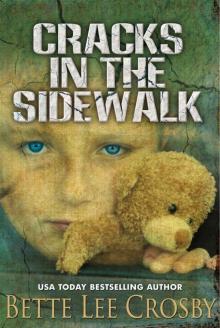 Cracks in the Sidewalk
Cracks in the Sidewalk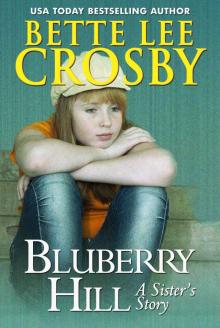 Blueberry Hill
Blueberry Hill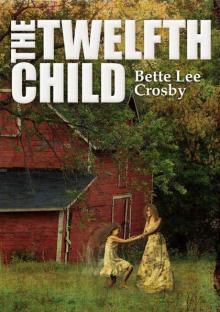 The Twelfth Child
The Twelfth Child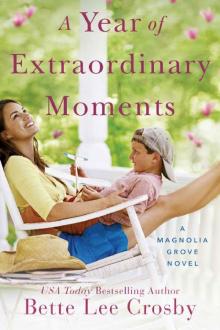 A Year of Extraordinary Moments (A Magnolia Grove Novel)
A Year of Extraordinary Moments (A Magnolia Grove Novel)